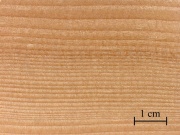Difference between revisions of "Western hemlock"
JMcGlinchey (talk | contribs) |
JMcGlinchey (talk | contribs) |
||
| Line 21: | Line 21: | ||
<gallery> | <gallery> | ||
| − | File:W hemlock 40x pits2label.jpg|Western Hemlock fiber stained with Graff | + | File:W hemlock 40x pits2label.jpg|Western Hemlock fiber stained with Graff "C" Stain |
</gallery> | </gallery> | ||
Revision as of 14:06, 22 August 2014
Description
A strong, tall hemlock, Tsuga heterphylla, native to the northwestern Pacific coast of Canada and the U.S. The western hemlock produces a soft, lightweight wood with a straight, fine grain. Peak production was in 1927. The lumber was used for millwork, construction, boxes, fences, and boats.
Synonyms and Related Terms
Pacific hemlock; west coast hemlock; Tsuga heterophylla; hemlock fir; Prince Albert's hemlock
| Density | 28 pcf |
|---|
Paper fiber type: softwood. Using transmitted light microscopy, fibers are identified by the presence of small piceoid and cupressiod ray parenchyma pits. Ray tracheids are non-dentate and usually collapsed. Appearance with Graff "C" stain: varies with pulping method. Average dimensions of fibers: length, 4.2mm; width, 30-40 μm. Common pulping method: kraft (sulfate) and sulfite.
Additional Images
Authority
- G.S.Brady, Materials Handbook, McGraw-Hill Book Co., New York, 1971 Comment: p. 394
- Dictionary of Building Preservation, Ward Bucher, ed., John Wiley & Sons, Inc., New York City, 1996
- External source or communication Comment: West Coast Lumbermen's Association, Seattle, Wash.: air-dry weight = 28 pcf
- Encyclopedia Britannica, http://www.britannica.com Comment: "hemlock." Encyclopædia Britannica. 19 Oct. 2004 .
- Marja-Sisko Ilvessalo-Pfäffli. Fiber Atlas: Identification of Papermaking Fibers (Springer Series in Wood Science). Springer, 1995.

